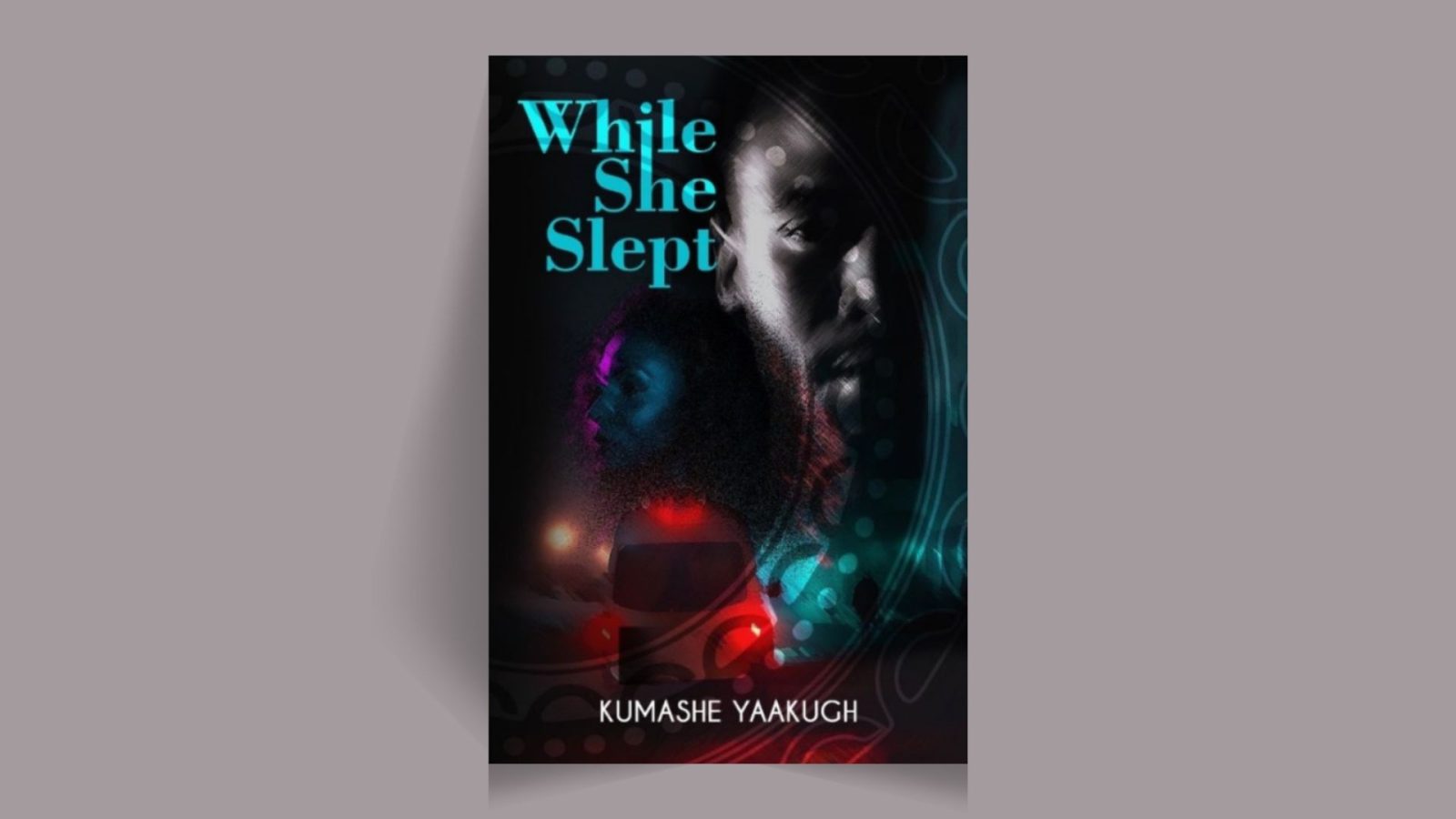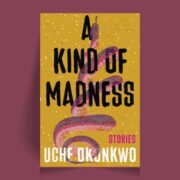While She Slept destabilises easy binaries between tradition and modernity, reminding us that both can be sites of violence and resistance.
By Joemario Umana
for Jola and her blue heart.
Not that this detail matters, but I wrote this with Kendrick Lamar’s 2017 track, “DUCKWORTH” playing in the background. I confess, after weeks of binge-reading novels that portray men as nothing more than phallocentric beings—the sole plague the world needs deliverance from—Kumashe Yaakugh’s While She Slept was the biblical saviour I needed.
While She Slept resists genre conventions, employing the supernatural not as a means of escapism but as a framework through which memory, trauma, and cultural resistance are explored.
Set in Makurdi, the often-neglected capital of Benue State, the narrative stages a return—not only for its protagonist, Tarfa Tsar Agerzua, but also for readers habituated to locating Nigerian literary innovation within the metropolitan axes of Lagos and Abuja (a tendency reinforced by the dominance of diaspora authors). This narrative shift is deliberate. It is also political. Or so I choose to believe.

The story is set on the protagonist returning to his childhood city for a work assignment, not realizing what’s in store for him, and his fate is cross linked with two others, Lily and Bishop (siblings), a thing that will change his life forever. The story is not a crime thriller in the conventional sense, but a metaphysical excavation: of family, of history, of the ways silence is deployed as both weapon and refuge.
Stylistically, Yaakugh writes with a quiet precision that recalls the best of literary minimalism. Her language avoids excess, allowing the narrative to unfold with the gravity of oral storytelling. This is intentional. She also weaves in relatable experiences that resonate, especially for readers of African—specifically Nigerian—descent.
One of such experiences, you can read in the first paragraph of the book’s first chapter. In many ways, While She Slept is a retranslation of African oral traditions into prose—ritualised, rhythmic, yet contemporary in its political stakes. The city of Makurdi is not merely a backdrop but an epistemological anchor. Its streets, churches, and spiritual undercurrents act as repositories of knowledge that the Western-educated eye often overlooks.
At the centre of While She Slept is a sophisticated inquiry into silence—its meanings, mutations, and mechanisms. Lily’s coma, we come to understand, is not merely a medical state; it is a political one. Bishop, her abuser, is no stock villain. He is a hyper-intelligent, structurally disadvantaged man whose genius is curdled by lies and loss. In his betrayal lies a cautionary tale about what happens when the marginalised internalise the logic of domination. He does not dismantle the house that excluded him—he attempts to burn it down.
In contrast, Tarfa represents a different kind of response: reluctant stewardship. His ability to communicate with the dead positions him not as hero, but as mediator—a figure reminiscent of the priest-diviner in many African ontologies.
Yet, Yaakugh resists romanticising this role. Tarfa is overwhelmed, often ambivalent, even skeptical. His is a spirituality marked not by triumph, but by fatigue. In doing so, While She Slept destabilises easy binaries between tradition and modernity, reminding us that both can be sites of violence and resistance.

Progressing, another element particularly appreciated in the book is its refusal to lean on the tired trope of men as inherently phallocentric beings. Even in moments where the male characters might have easily slipped into caricature—Tarfa, with his brief playboy phase, and Bishop, with his calculated scheming driven by a bitter vendetta against his adopted family—Kumashe Yaakugh maintains a textured portrayal.
She sidesteps the phallocentric impulse that dominates much of patriarchal storytelling. These men are flawed, yes, but not reduced to the simplistic embodiments of toxic masculinity. Their motivations are presented with nuance, allowing readers to understand the socio-emotional backdrops of their actions rather than flattening them into one-dimensional antagonists.
While She Slept’s preoccupation with sleep—as state, metaphor, and system—invites a deeper reading. In Nigerian political discourse, sleep is often the language of denial: governments “sleeping” through crises; citizens “asleep” to systemic injustice.
Subtly, you can read it when Yaakugh has Tarfa show his displeasure as he shook his head at the potholes ridiculing the roads of Makurdi (a supposed state’s capital). He’s further disappointed how little has changed in Makurdi, and he despises the state’s capital for its inglorious backwardness. This, can be tied to the laziness of the state’s government. In the novella still, sleep becomes both affliction and resistance. Lily’s sleep is enforced, yet her presence—however spectral—animates the plot.
She becomes what theorist, Achille Mbembe, might call a “living archive”: not merely passive memory, but an active force haunting the present.
This haunted-ness is central to the novella’s politics. In refusing to resolve itself neatly, the text mirrors the unfinished business of postcolonial life. Bishop is not vanquished; Tarfa remains unsettled; Lily’s future is ambiguous. Rather than closure, Yaakugh offers confrontation—between siblings, between histories, between epistemologies.
In this sense, the novel participates in a broader tradition of African speculative fiction that uses the uncanny to critique the real: from Amos Tutuola’s surrealism to Ben Okri’s metaphysical realism, and more recently, the feminist hauntings of writers like Akwaeke Emezi and Nnedi Okorafor.

But Yaakugh’s intervention is distinct. Where many speculative works gravitate toward the global or the diasporic, she roots her narrative unapologetically in local cultural systems. Tiv spiritualties, oral traditions, and communal memory are not exotic backdrops—they are the architecture of the world she builds. In this, she does not merely write about the supernatural. She decolonises it.
Yet, the novella is not without its challenges. Its pacing can feel uneven; the reader is often asked to dwell in moments of narrative quiet that risk being read as inertia. But to demand linearity from such a text is to misunderstand its ethos. The book is structured like a ritual, not a thriller. Its revelations arrive not through plot twists but through repetition, atmosphere, and spiritual accumulation.
Ultimately, While She Slept is a significant contribution to Nigerian literature—not only for its narrative daring, but for its refusal to separate the personal from the political, the spiritual from the structural. It reminds us that silence is not always absence; sometimes, it is resistance. And sometimes, the most radical thing a character can do is listen—to their ancestors, to their ghosts, and to the language of those who cannot speak.
In an era where so much of our cultural production is driven by spectacle, Yaakugh’s debut doesn’t clamor for all that attention.
Still, it announces itself and demands to be recognised for the powerful work of speculative fiction that it is. It acts as a call to wakefulness, a call to remember—urging us to reckon with what we’ve overlooked or forgotten. It is because of this, that this book is highly recommended if you haven’t read it. It is a vital and necessary work that needs not to be neglected or dismissed.
Joemario Umana, Swan XVII, is a Nigerian creative writer and a performance poet who considers himself a wildflower. He was shortlisted for the Sophon Lit’s poetry contest and is the author of the poetry pamphlet titled, A Flower Is Not The Only Thing That’s Fragile, published by Konya Shamsrumi. He tweets @JoemarioU38615.



